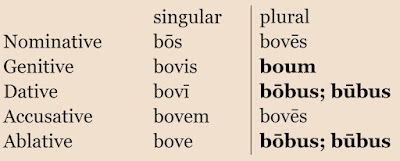In Rome two consuls were elected each year, serving together, each with veto power over the other's actions. Roman years were customarily denoted according to the names of the two consuls who held office that year, which is not an immediate answer to a modern reader. The names of holders of the post and the post itself are expressed using the ablative absoute:
[i]
C. Asiniō C. Antistiō (nouns) [ii] cōnsulibus (nouns) ¦
nōnus Tiberiō annus erat compositae reī pūblicae, flōrentis domūs … (Tacitus: Annālēs
4.1)
Literally:
[i] (with) C. Asinius and (with) C. Antisitius ¦ [ii] (being) consuls …
>
When / while C. Asinius
and C. Antistius were consuls ¦ it was for Tiberius the ninth year of an
orderly state and flourishing household …
Here
Tacitus pays no more than lip-service to consular dating by employing the ablative
absolute construction to detach the consular year from the main
action thereby underlining the limitation of the consuls’ role; there
is juxtaposition with nōnus Tiberiō annus i.e. the ninth year was
already in progress (began the previous August) but the consuls were not in any
way the cause of the positive conditions of the reign of Tiberius.
Some
examples include both the names of the consuls and the number of years since
the founding of the city (ab urbe conditā) traditionally considered as
753BC:
C. Fabiō et
L. Virgīniō cōnsulibus │ During the consulship of Gaius
Fabius and Lucius Virginius [ablative absolute: literally with GF and LV being
consuls i.e. while they were the consuls]
L. Genuciō
et Q. Servīliō cōnsulibus mortuus est Camillus. │ Camillus died
during the consulship of Lucius Genucius and Quintus Servilius
[i] M. Tulliō Cicerōne ōrātōre et C. Antōniō
cōnsulibus, ¦ [ii] annō ab urbe conditā
sexcentēsimō nōnāgēsimō primō … │[i]
During the consulship of Marcus Tullius Cicero, the orator and Gaius
Antonius ¦ [ii] in the 691st year from the founding of
the city
[i] C. Fabiō Liciniō C. Claudiō Canīnā cōnsulibus
¦ [ii] annō urbis conditae
quadringentēsimō sexāgēsimō prīmō ¦ lēgātī Alexandrīnī ā Ptolemaeō missī
Rōmam vēnēre et ā Rōmānīs amīcitiam quam petierant obtinuērunt. │ [i] During the consulship of Gaius
Fabius Licinius and Gaius Claudius Canina ¦ [ii] in the 461st year of the
founding of the city ¦ ambassadors from Alexandria sent by Ptolemy came to Rome
and obtained the friendship that they had sought.









